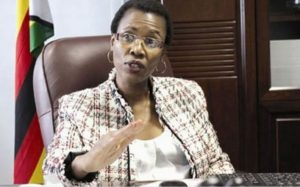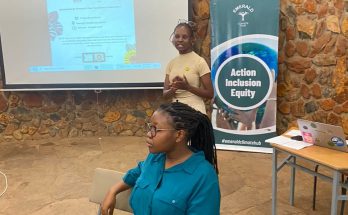
By Nesia Mhaka
The Ministry of Energy and Power Development in partnership with energy stakeholders and development partners have launched a hydrogen project (H2Atlas), an initiative which could lead to a new era of cheap, clean and renewable energy.
The H2Atlas-Africa project is an initiative of the German Federal Ministry of Education and Research (BMBF) in partnership with a consortium of African relevant research institutions and organisations and it was officially launched in June this year at Forschungszentrum Jülich GmbH.
Forschungszentrum Jülich GmbH is the lead technical partner and is supported by Southern African Science Service Centre for Climate Change and Adaptive Land Management (SASSCAL) as the coordinating partner in Southern Africa, the Southern African Development Community (SADC) Centre for Renewable Energy and Energy Efficiency (SACREEE) is a key strategic player for the implementation.
The aim of the project is to support sustainable and economic development in Africa through a viable hydrogen economy. The project will first and foremost explore the potential of Green Hydrogen production from the vast renewable energy sources within the African continent.
The Government of Zimbabwe through the Energy and Power Development ministry has nominated ‘clean hydrogen’ as a priority low-emissions technology that could eventually help replace fossil fuels in transport, electricity and in industrial processes as the world moves to cut greenhouse gas emissions.
Speaking at the inception workshop of the Green Hydrogen Atlas recently, the Permanent Secretary in the Ministry, Dr Gloria Magombo encouraged all stakeholders in energy sector to invest more in hydrogen production to promote sustainable green industry.
“I also wish to challenge local research and academic institutions as well as State Enterprises in the energy sector to start thinking about opportunities that ‘green hydrogen production’ may present. Energy transition is here, don’t get left behind.
“I urge all stakeholders here present to participate in the discussions planned for this workshop so that the Green Hydrogen Atlas Project is established on a firm and sure foundation. The Project Team depends on your knowledge and expertise in this and other future energy projects,” she said.
She also said using hydrogen as a source of fuel is a cleaner method which will assist the nation in curbing emissions.
“At global level, it has become increasingly obvious that the energy sector is undergoing a transformation. Energy transition was traditionally spurred by energy demand due to industrialisation.
“However, the current transition to renewable energy and other modern forms of energy, including energy efficiency, is driven by the need to decarbonise our economies.
“Since fossil fuels are one of the largest emitters of greenhouse gases, we need to embrace new and green energy forms for use in agriculture, mining, industry and other sectors of the economy.
“The supply of hydrogen to industrial users is now an important business worldwide. In this country, hydrogen has traditionally been required at Sable Chemicals for making fertilizers.
“The global hydrogen demand, which is reported to have more than tripled since 1975, continues to increase.
“At present, the production of hydrogen uses fossil fuels, with six percent of global natural gas and two percent of global coal destined for hydrogen production,” said Dr Magombo.
She added that the introduction of Green Hydrogen project in the country was in line with the renewable Energy and Bio-fuel Policy which was launched by President Mnangagwa early this year.
“However, there is a non-polluting alternative that is “green hydrogen”, which is produced from renewable energy sources through electrolysis of water.
“Evidence from around the globe shows that the adoption and development of policies and the building of infrastructure for the use of renewables, including green hydrogen, is likely to take lesser time than was taken to industrialise using fossil fuels.
“As such, we are glad that the proposed Zimbabwe Green hydrogen Atlas will help us access our potential, preparedness and also point out available opportunities.
“Government has already taken the bold decision to launch the Renewable Energy Policy of 2019 which clearly articulates the Ministry’s drive towards accelerating the use of underutilised resources such as solar, mini-hydropower, bagasse among others.
“The Policy has various incentives which investors who wish to develop green hydrogen projects can benefit from,” she said.
Speaking at the same event SACREEE executive director Mr Kudakwashe Ndhlukhula said transitioning from fossil fuels to renewable energy represents a co-benefit in terms of reduction of greenhouse gases and reducing pollution from fossil fuels.
“This project has a high potential of making Africa an exporter of Green Hydrogen, hence gaining more relevance in the international energy market and reducing dependence on fossil fuels.
“This project is best suited for the SADC region which is generously endowed with renewable energy resources such as solar, wind, and hydro.
“One of the problems of generating electricity via renewable power is that the output either needs to be used immediately or stored.
“Using renewable power to produce hydrogen allows the capture of electricity in an environmentally-friendly state which is easily stored and distributed,” he said.
SASSCAL executive director Dr Jane Olwoch also said hydrogen has a strategic importance in the pursuit of a low-emission, environment-benign, cleaner and more sustainable energy system.
“The combustion product of hydrogen is clean, which consists of water and a little amount of nitrogen oxides.
Hydrogen has very special properties as a transportation fuel, including a rapid burning speed, a high effective octane number, and no toxicity or ozone-forming potential.”



